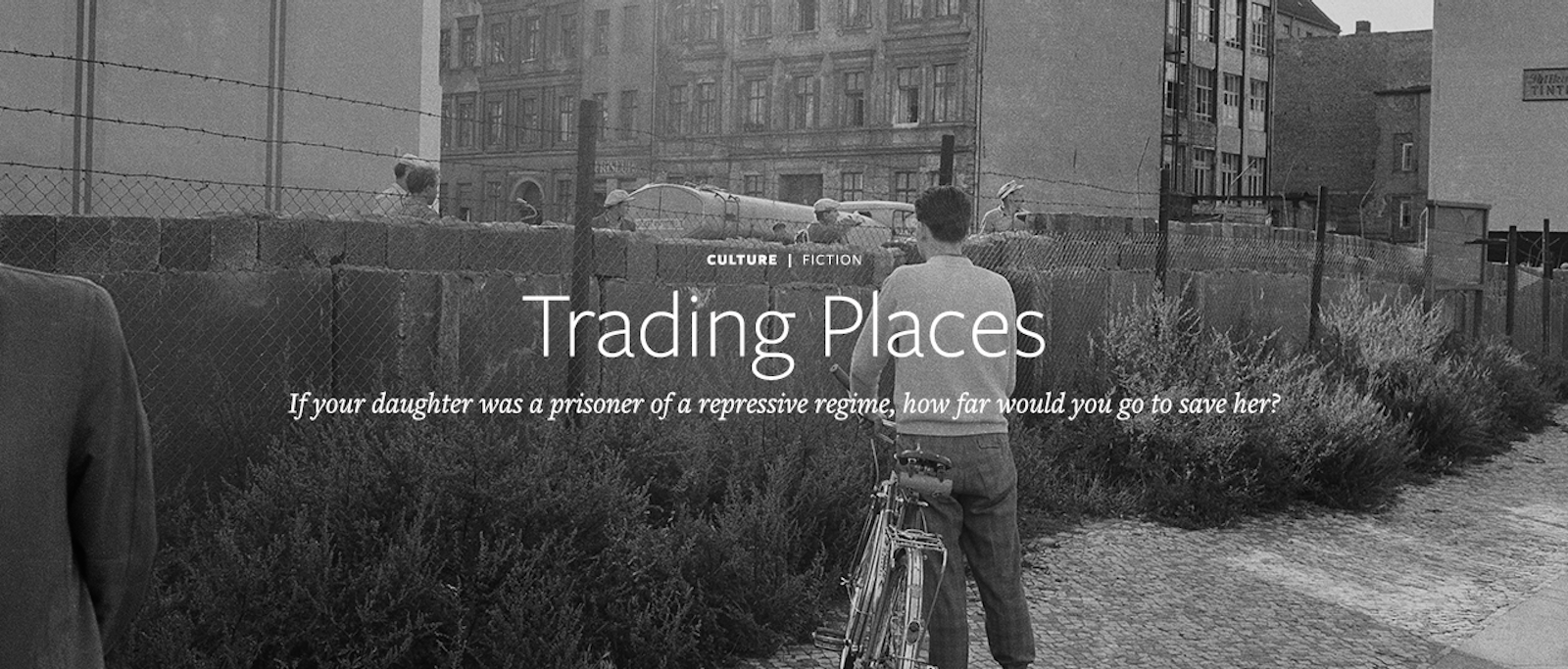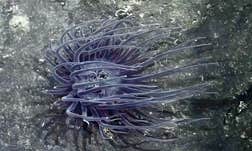A lone figure cycled through the night streets, cans of spray paint tucked into a basket strapped to the back of the bike. The tires slid over slick pavement and plowed V-shaped channels through puddles that formed in the cratered streets. The air smelled of old rags and sulfur from the smog that had held Leipzig in a chokehold for weeks, but the malodorous condensation offered cover for clandestine activities.
The cyclist stopped in front of a Konsum supermarket and grabbed three spray cans from the basket. One after the other, they hissed as words formed a coded message on a wall, the murky night robbing red, green, and yellow of their hues. Workers Unite! The graffiti artist would have risked capture to see the sour expression of the VoPo, the Volkspolizei officer, who discovered the familiar Communist slogan splashed across the bricks, like an old friend now spitting in his face.
A block down the street, the paint spray danced around small craters in the wall of a bank, mementos of the long-finished war. Trade unions are the voice of the proletariat!
Then, in case anyone failed to draw a connection to the Polish strikes that had been robbing East German officials of their sleep for the better part of a year, the final message of the night consisted of three cryptic words:
Solidarität.
Solidarity.
Solidarnosc.
Monday, 26 October 1981
Lieutenant Alexander Maibeck stepped out of the decaying mansion that had once been his ancestral home, pulled a handkerchief from his pocket and held it to his nose. The air was as thick as pea soup and nearly as green, a toxic chemical fog spewing from the refineries on the edge of town. He vaguely remembered the time, many years ago, when Leipzig air was clear and breathable. Back then, the crumbling house behind him belonged to his aristocratic parents and not the German Democratic Republic, which divided it up into a dozen apartments and parceled them out to families left destitute by the war.
His mind leaped ahead to the day’s cases awaiting him at the Leipzig Volkspolizei, where he worked as a criminal inspector, and he almost missed the large red letters splashed across the sidewalk at his feet.
Solidarnosc.
It was another message from the vandal who’d been keeping city officials on a state of nervous alert for the past three weeks. Almost cynical in its use of familiar anti-capitalist slogans, the graffiti pointed out the singular truth of what socialism had become. Not a defender of the proletariat but an oppressor of the same working class it professed to support. Unease traced icy fingers through the pit of Maibeck’s stomach. Now that the agitator had brought Solidarnosc to his own doorstep, he feared the Polish troubles would soon spill over the border and disrupt his world.
Squaring his shoulders, he crossed the street to his red Trabant and unlocked the door, then paused before climbing behind the wheel. Apprehension struggled with joy in the pit of his stomach as he spotted a young woman wheeling a bike down the street. The black leather bomber jacket and matching pants conspired with a frame of dark curls to make her face look paler than usual. She wore a blue knit scarf around her neck, the one he’d given her for Christmas the previous year.
Maibeck eyed her warily. “Hello, Katya.” He needed only one hand to count the times his 19-year-old daughter had visited him in the past year—and usually because she wanted a favor.
She leaned the bike against the wall and faced him. “I know how much you hate to be late for work, Alex. This will only take a minute.”
She’d stopped calling him Papa the day her mother had filed for divorce. It was as though Katya had divorced him as well and thought of him only as some guy who had once lived in her house. The coldness of his name on her lips cut just as deeply now as it had when she was 9.
He wanted to say that he always had time for her, but the truth was different. He’d never had enough time back when it mattered, always putting duty and Party business before family.
“Do you want to come upstairs?” he asked.
She shook her head, making her curls dance above blue eyes, which resembled his own so much. “Can we sit in your car for a minute?”
Now that the agitator had brought Solidarnosc to his own doorstep, he feared the Polish troubles would soon spill over the border and disrupt his world.
He slid behind the wheel and opened the passenger door. She sat for a moment in silence, toying with the end of her scarf. “I’m going to Poland tomorrow. Be back—”
“The hell you are!”
“—Friday. And I knew you’d feel that way. But I’m going anyway. Daniel’s grandfather died and he’s invited me to the funeral.” She looked down at her fingers, smoothing the fringe of her scarf the way she did as a child when Maibeck would catch her in a lie.
His blood ran cold. Was the planned trip with her half-Polish boyfriend merely a diversion so Maibeck would not suspect what they were really up to?
“I’m sorry for your friend’s loss, Katya, but it’s a bad time to go.”
“I know what you’re thinking. People are saying the Soviets will invade Poland and put an end to Solidarnosc and the strikes.”
Or we will, Maibeck thought. President Honecker had as much as said so to the Soviet leader, Brezhnev, a detail that had not been reported in the news but nevertheless made its way through the Volkspolizei rumor mill.
Katya’s lips tightened into a thin line. “You just don’t like Daniel. You never have.”
“He’s a troublemaker,” Maibeck replied. Daniel Kaminsky had fallen in with an opposition group that wanted to form a trade union similar to Solidarnosc, and Maibeck wouldn’t put it past him to try to smuggle forbidden documents into the country on the return trip.
“He’s trying to make things better here. But you wouldn’t understand, would you, Alex? You’re happy the way things are in this police state of ours, where everyone else is afraid of the authorities. Oh, right, you’re a policeman. How could I forget that?”
“Don’t let anyone hear you talk like that.” Maibeck’s tone was sharp enough to make Katya flinch. And she was wrong. It was the authorities who were afraid of the people, and the knowledge gave him shame, not joy. Why was it that every conversation he had with Katya ended in an argument about Daniel?
“Does your mother know about your plans?” It was the only safe question he could ask.
“No. And I don’t want you to tell her.”
“Why not?”
“She’d just worry.”
And he wouldn’t? Her words stung.
“Why are you telling me, then?” he inquired.
She glared at him. “I don’t know. Somehow, I must have thought you’d care. Stupid me.” She opened the door and climbed out.
He lunged for the door and stopped it from closing. “Call me the minute you get back.”
She stood still, one hand on the door handle. Tall, dark haired, and temperamental, she resembled him far more than she did her petite blonde mother.
“Please, Katya.”
“Sure. Whatever.”
It was the closest thing to a promise he could extract from her. But he knew she’d keep her word.
Monday, 2 November 1981
Maibeck stood in front of the Runde Ecke, the wedge-shaped monstrosity that housed the Ministry of State Security and rubbed the back of his neck to ease his mounting tension. Distasteful as it was, he often collaborated with the Stasi. Well, that’s what they called it. Coerced was how he would describe it. Every interaction with the Stasi was an exercise in cryptology in which every word could have a double meaning.
“When the Stasi tell you to jump,” his superior officer had once told him, “the only question you ask is how high.”
Maibeck hadn’t jumped when Roland had summoned him. He’d finished his paperwork, drained his cooling coffee and taken his time to find a parking spot on Dittrichring. But the delay hadn’t helped settle his uneasy nerves.
His mind kept straying to Katya, his worry for her an unwanted distraction. Despite her promise, she’d failed to call him on Friday, the day she was supposed to return from Poland. The same day, the East German authorities had sealed the Polish border to halt the flow of information about Solidarnosc strikes, which had spread from the Gdansk wharves to coal mines in the country’s interior. Maibeck doubted any barrier was so impervious that information could not pass, but he knew better than to voice his opinions at Party meetings on the increasingly rare times he attended. Still, the closure effectively prevented citizens from passing in either direction, and for all he knew, his daughter was stranded on the wrong side, alone with a dubious boyfriend. Maibeck had never felt so helpless.
He found Roland in an office on an upper floor, seated behind a tidy desk, a short, wiry man who seemed to leach all color from his surroundings. Everything about him faded into sepia—his graying hair, his rumpled suit, the dull surface of his shoes.
But his colorless eyes sparkled with displeasure at having been kept waiting. “So glad you could make our meeting, Baron Maibeck.”
Maibeck stiffened at the other man’s use of the aristocratic title he’d never wanted, but then he felt ashamed. He’d thought he’d moved past such emotional responses. He’d certainly worked hard enough to overcome the disadvantages his noble birth had created in the new socialist society, and his success proved he had no reason to feel inferior. But Benno Roland excelled in sniffing out other people’s weaknesses and turning them into liabilities. He’d always had that skill, even back when the two men were schoolmates at Karl Liebknecht Polytechnic.
The closure effectively prevented citizens from passing in either direction, and for all he knew, his daughter was stranded on the wrong side, alone with a dubious boyfriend.
“Have a seat.” The Stasi agent gestured to a chair in front of the desk.
Maibeck preferred to remain standing. “What can I do for you, Benno?” He had a fair idea of the answer—even though Roland had revealed nothing of his intentions on the phone, Maibeck had already picked up some visual clues. The usually tidy agent’s crooked tie and creased clothing spoke of long hours at the office. The shadows under his eyes meant he wasn’t sleeping. The vandal that people were starting to call the Solidarnosc Scribbler had eluded capture for nearly a month. Such a failure would be intolerable to an organization that recorded even the most mundane details of people’s lives in its ever-expanding files.
Roland folded his hands and laid them flat on the table. “We must stop this terrorist who is defacing our city. Now that the border’s closed, he’s a greater threat than ever. His cryptic messages could very well incite a riot!”
While Maibeck agreed that the threat was real, he thought “terrorist” was a bit overstated. “He? Are you certain it’s a man?”
“Yes. The subversive’s been spotted from a distance.”
Maibeck read the agent’s sour expression as a clue that the man’s gender was all they knew. And it rankled.
“Fine,” he said, eager to end the meeting. “I’ll put a team together and send them over.”
Roland’s eyes shrank to hard slits. “No you won’t. I need the Volkspolizei’s most senior detective. But since Major Becker is on sick leave, I’ll have to settle for you.”
A flush heated Maibeck’s face. Despite two decades of dedication to job and Party, he’d never managed to shatter the glass ceiling imposed by his aristocratic blood.
When he could speak without bitterness, he said, “It will be difficult. We’re a bit short-handed at the moment.”
Roland folded his arms over his chest and glared. “Do not underestimate the seriousness of the situation. These mutinous codes are like a virus. They insinuate themselves into the minds of good socialists and spread corruption. We must be relentless in rooting them out.”
Maibeck searched his mind for a response. As they were no doubt intended to do, the words chilled the part of him that still believed socialism would inevitably triumph over the crumbling capitalist society. But his rational mind knew Roland was overreacting. One man with a can of spray paint wasn’t going to bring the German Democratic Republic to its knees.
“I have every confidence that you will catch the vandal soon. Unfortunately, the city’s other criminals haven’t chosen this moment to take a vacation. Quite the contrary—”
“Look at this.” Roland slapped two photos onto the desk and pushed them toward Maibeck with such force, the policeman had to lurch forward to catch them before they fluttered to the floor. They showed two different angles of the same slogan, written in large, balloon letters. Nothing can hinder the progress of socialism. It was the kind of message that shouted from billboards all over town, extolling the citizens to work hard. To respect the state’s authority. To become better socialists. Presumably without the benefit of independent trade unions. But such messages were not spray-painted on walls in the dead of night.
Every interaction with the Stasi was an exercise in cryptology in which every word could have a double meaning.
This slogan was a taunt, encoded in the language that every East German understood: We will force you to conform to our socialist model no matter how far it strays from the Marxist ideal.
“We cannot tolerate such disrespect!” Roland slammed his fist on the desk so hard it shuddered. “This saboteur will be stopped.”
Maibeck pushed the photos back across the desk. He couldn’t say whether he resented the mockery of Stasi authority—and by extension his own—or whether he feared the excessive retribution Roland would exact upon the Scribbler’s capture. It made no difference whether his slogans were secret codes or taunting messages, the punishment would be harsh.
Either way, Maibeck wanted no part of it. There’d been a time when he would not have dared to refuse the Stasi’s request. But nothing Roland could do to him was worse than what he’d done to himself with his determination to obliterate his past. Ideology, he’d discovered, was no substitute for the warmth of family. “Good luck. It’s always a pleasure to see you, Benno.”
He had his hand on the knob when the Stasi agent’s voice sent goose bumps up his arms.
“Everyone has his breaking point, Baron.”
Maibeck turned around. The smug look on Roland’s face brought him back to their shared childhood when Benno had found an old volume of local history that detailed the cruelties Maibeck’s aristocratic ancestors had imposed on their serfs. The bully would recount the stories in front of their classmates, casting young Alexander in the role of perpetrator by way of his blue blood, then call upon the other boys to act as judge, jury, and executioner. But this time, the half-smile on the adult Benno Roland’s face promised not playground humiliation but something far worse.
Maibeck had little trouble deciphering Roland’s statement. He instantly knew why Katya hadn’t called.
“I want to see her!” Maibeck dashed across the room to the agent who sprawled in the chair with a gloating look on his face.
“All in good time. First I need assurance of your cooperation.”
Maibeck grabbed Roland by the lapels and lifted him out of his chair. “Let me see her. Now!”
The other man gripped Maibeck’s fists, pulling them off his jacket. “Fine. We’ll discuss the terms of your involvement afterwards.”
Maibeck’s stomach tied itself into knots as he entered the interrogation room in the basement of the Runde Ecke. It was an unwelcoming space with only a square wooden table in its center and two chairs. The only thing that interrupted the monotony of the bleak walls was a photo of President Honecker, looking deceptively mild behind his dark-rimmed glasses.
Katya sat at the table, slumped forward, face buried in her folded arms. Her dark curls lay matted against her scalp, in need of washing. She’d been in Stasi custody for three days and they apparently hadn’t let her take a shower. Maibeck’s heart contracted at the sight of his sleeping girl, so fragile and vulnerable.
Katya jerked upright at the sound of the door clicking shut, and the words of greeting Maibeck had prepared died in his throat. She had a split lip, a dark bruise blooming on one cheek, and fury in her red-rimmed eyes.
“You!” she said. “I should have known.”
“Are you all right?” He leaned over the table and tried to touch her cheek, but she slapped his hand away.
“Do I look all right to you?”
The usual sleep deprivation hadn’t been enough for Roland. In a moment of horrible clarity, Maibeck knew the marks of violence had been inflicted for his benefit, in case he still had any doubts about cooperating.
“What happened?” he asked.
“As if you didn’t know.”
Maibeck was aghast. “You think I am responsible for this?”
“You were the only person who knew we were going to Poland. No one else knew when we were coming back.”
He flinched. Did she think he had the power to detain people at border crossings? “And why would I want to have you arrested? You were only going to a funeral.”
Katya looked down at her hands, her pale skin coloring—like a key to a code that accidently leaked. Maibeck immediately knew the truth: There’d been no funeral.
He wanted to ask where she and Daniel Kaminsky had gone instead. A secret meeting with Solidarnosc strikers? But the Stasi agent would be monitoring their conversation through a camera hidden somewhere in the room. He glanced up at the picture of Honecker and guessed the lens lay behind it. Very likely it peered through the man’s eye. That was just the sort of cynical gesture Benno Roland would find amusing.
One man with a can of spray paint wasn’t going to bring the German Democratic Republic to its knees.
Maibeck hadn’t had the presence of mind to ask Roland what crime Katya had been charged with, but he suspected she’d tried to smuggle Solidarnosc propaganda into the GDR. It was the only explanation for how she’d landed in Benno Roland’s clutches. The Stasi agent probably employed a border guard to monitor people crossing the Polish border in the desperate search for leads on the identity of the Solidarnosc Scribbler. Catching Katya must have been an unbelievable stroke of luck, with its potential for blackmailing her reluctant father.
He stood up and resisted the urge to reach for her hand, knowing he couldn’t bear to feel her pull away. “I’m going to get you out of here.”
Katya just shrugged as though she didn’t give a damn what he did. But he didn’t miss the tiny spark of hope in her eye, an expression just as quickly suppressed.
When he reached the door, she spoke. “Do me a favor, will you, Alex?”
He turned and saw her gazing at him with those cool blue eyes. “Of course, anything.”
“Find out what happened to Daniel. The Stasi didn’t arrest him, which means he must have stayed in Poland and crossed the next day.”
Maibeck shook his head. “He couldn’t have done that. The authorities sealed the border just hours after you crossed.”
Joy lit up her pale face, and she let out a breath. “He’s still in Poland, then. He’s safe.”
A new masterpiece of graffiti art took shape in the shadow of the Wisdom Tooth, the molar-shaped tower that rose above Karl Marx Square and housed the administrative offices of one of Europe’s oldest universities. It was a risk working in such a public part of the city, especially now that the onset of cold weather had dissipated the thick, greenish smog. But nearly two months of escaping detection had emboldened the graffiti artist, who thoroughly enjoyed his rise from “that vandal” to the “Solidarnosc Scribbler.” The VoPos had to be pissing themselves with frustration, and the image brought a smirk to his lips.
The can of spray paint shot the words onto the first wall: We stand shoulder to shoulder with our Polish brothers. The Scribbler wrote fast, and the sound of paint hitting stone echoed into the silent night.
On the second wall, he sprayed three words: Frieden. Peace. Mir. The letters looked black in the dim light, the message a coded response to rumors of a Red Army crackdown to the Polish strikes.
As the Scribbler rounded the building for the third slogan, a sound froze him in his tracks. A car door slammed shut.
He peered around the corner. A man crossed the square from a car parked on the street, a flashlight in one hand. A VoPo!
Damn the police! They lurked everywhere.
The Scribbler searched for an escape route. His bike stood yards away, across the open square. He’d left it leaning against the wall of the Neues Gewandhaus, the new concert hall that had opened just weeks before, wanting only to spare it the inevitable spatters of paint. To reach it, he had to leave the safety of the shadows and step into the newcomer’s line of vision. But if he abandoned the bike, its license plate would give him away.
He gauged the distance and quickly calculated an escape route. It would be a close call, but he saw no other way. He stuffed the spray can into his sweatshirt pocket and pulled up the hood.
Then he ran.
The VoPo gave a jerk of surprise and pulled a gun from his belt. “Halt! Volkspolizei!”
The command nearly made the Scribbler trip over his own feet. This policeman wasn’t just any VoPo. He knew that voice.
But he kept on running. An itch formed between his shoulder blades as though he had a target painted there. His ears strained for the sound of a gunshot.
When he reached the bike, he glanced over his shoulder and saw the VoPo talking into a radio. Soon, the square would be swarming with police.
He swung one leg over the bike and pushed away from the wall. Within seconds, he was racing through the twisting streets behind Karl Marx Square. One benefit of his nocturnal mission was intimate familiarity with Leipzig’s back alleys. He knew how to lose a pursuer and, most importantly, he knew the best places to hide.
Monday, 21 December 1981
O
n the top floor of the Runde Ecke, Maibeck leaned over Benno Roland’s desk and let the Stasi agent feel the full force of his rage. “There has not been any graffiti for two weeks. Let me take my daughter home.”
“No.” Roland glared back, his eyes slightly unfocused, his breath smelling of schnapps. Maibeck had never known the man to drink on the job—or at any other time. There were other signs of emotional deterioration. A typically tidy desk littered with loose papers and forgotten meals. A bowl of Hungarian goulash congealing around a plastic spoon. A lump of brown mustard on a paper plate, jagged slices of bratwurst stuck to it, looked like it had grown a skin. The room reeked of stale food and perspiration.
“These mutinous codes are like a virus. We must be relentless in rooting them out.”
Although Maibeck hadn’t seen Roland for over a week, he knew what had caused the additional stress. Eight days ago, the Polish Prime Minister, General Jaruzelski, had declared martial law and outlawed Solidarnosc, imprisoning the trade union’s leaders. Although the border between the two countries remained sealed, Maibeck doubted there was a citizen anywhere in the German Democratic Republic who had failed to learn that Lech Walesa, the charismatic trade union leader, had become a political prisoner. Without Leipzig’s famous vandal behind bars, Roland was being made to feel personally responsible for the crisis on the other side of the border.
“Our Scribbler has probably left the country. There’s nothing more I can do.” If Maibeck didn’t get Katya out soon, he feared the Stasi agent would take his frustrations much too far and seriously injure her. Everyone had their breaking point, and Benno Roland looked close to his.
“I should find someone to replace you,” Roland said. “The one time you came within sight of the agitator, you screwed it up.”
Maibeck couldn’t argue with that, although every muscle in his body tightened in protest at the thought of being removed from the case—and denied even the small access he had to Katya. He’d seen her only three times in the last six weeks, but three times was better than none. At least he would know that she was still alive, and her disappearing bruises meant that Roland hadn’t subjected her to any more physical abuse.
The sight of the man on Karl Marx Square three weeks ago had disconcerted Maibeck, and he’d hesitated too long to act. He hadn’t expected to actually catch the suspect, especially not in such an exposed location. By the time he’d called for backup, the cyclist had long since disappeared, and Roland had read Maibeck the riot act for not having more men with him. But there wasn’t enough manpower to go around. The city’s other lawbreakers—the thieves, rapists, murderers, and smugglers—hadn’t conveniently abandoned their activities just so the police could focus on catching one spray-painting delinquent.
“You’re not going to replace me, Benno,” he said. “Who else are you going to blackmail into pulling double shifts?”
Roland’s lip curled into an almost canine snarl. “Get me this traitor by the end of the week.”
“Let me see Katya,” Maibeck pressed. “Five minutes is all I ask.”
The Stasi agent shifted some papers on his desk, and Maibeck, nerves taut with anticipation, couldn’t decrypt whether Roland was pondering the question or ignoring it. When Roland glanced up, a wild look in his eyes made him appear slightly unhinged. “We are facing an existential crisis! All it takes is one spark, and before we know it, we’ll be sitting in our own jail cells.”
The letters looked black in the dim light, the message a coded response to rumors of a Red Army crackdown to the Polish strikes.
Maibeck’s blood chilled, but before he could summon a reply, a sharp rap sounded at the door, and a man appeared with an envelope.
Roland snatched it from his hand and slammed the door in the courier’s face without a word. He ripped the envelope open and withdrew a stack of photos. As he flipped through them, his face turned three shades of red and then went unnaturally white. “Well, you’re wrong, Alexander. The Solidarnosc Scribbler has not left the country. He was very busy last night.” He threw the photos at Maibeck. They scattered across the floor.
Maibeck bent over and gathered them together. The images came from all over the city. He recognized the entrance to the Mädler-Passage, a downtown mall. The Rathaus. The Nikolaikirche. A bakery somewhere unfamiliar. The Konsum grocery store on Straße des Achtzehnten Oktobers, across from the university dormitories. Every building had one thing in common: a single name emblazoned in large, red letters across one of its walls.
Walesa.
M
aibeck showed his badge to the guard behind the desk of the Stasi jail. “I’m here to see Katya Maibeck.”
The fact that he didn’t have authority to do so would not cross the guard’s mind, not with an official badge flashed in his face. Not when the man flashing it was the girl’s father, an associate of Benno Roland. Still, Maibeck figured he had five minutes, maybe ten, before Roland found out and the interview would end.
He found her lying on a cot in her narrow cell, staring at the ceiling. Maibeck wished he’d thought to bring a book along for her to read. What did she do with her days? Probably worked out a hundred different ways to torture him once she got out.
Katya sat up abruptly, and for a brief moment Maibeck thought pleasure flashed through her eyes. “Hello, Alex.”
After the guard closed the door behind him, he made a move to sit on her cot. But she’d gotten control of herself and flinched away from him, so he remained standing.
“How is Mama holding up?”
“She’s fine.” Katya didn’t need to know about the phone calls he received from her mother daily. At first, they were angry and accusing. Later, they became pleading and tearful. They made Maibeck feel even more impotent.
“What about you? Are you all right?” He hated to see how thin and pale she’d grown. But at least there were no fresh wounds.
“Enjoying the palatial accommodations, as you see.” She swept a hand around the room. “I’d offer you a drink, but the butler just stepped out.”
He decided to be grateful that she could still crack a joke. “I can’t stay long, but I need to ask you something.”
She tilted her head away, feigning disinterest.
Maibeck wanted to ask what had happened that day at the border. Had Kaminsky deliberately handed her the Solidarnosc pamphlets Roland claimed he’d found in her possession? Or had Katya smuggled them in herself, wanting to prove her loyalty to her lover’s cause? There wasn’t time for such questions, and Maibeck knew that listening devices would be in the cell walls.
“If Daniel returned to Leipzig, where would he stay?”
“He’s still in Poland, Alex. Didn’t you tell me the border was closed?”
Aware that the guard could return in seconds, Maibeck sidestepped her question. “Where would he go if he didn’t want anyone to find him?”
Now it was her turn to decipher his questions—and when she did, anger flashed across her eyes. “He’s not the guy who’s going around writing those messages. If he was, I’d know.”
“And you’d tell me, of course.”
“Not a chance. But it’s not him.” She crossed her arms as though defending herself from his words.
Maibeck didn’t share her conviction. That night on Karl Marx Square, he’d developed a startling suspicion. It had been too dark to see the Scribbler’s features or even identify the color of his clothes. But Maibeck was nearly 100 percent sure that the other man had recognized him. Or his voice, when he’d ordered the runner to stop.
Many could identify Maibeck on sight—snitches, suspects, former convicts. He’d been a policeman in the same city for more than 20 years. But there was only one man he knew who had political connections to the opposition that supported Polish trade unions. If Daniel Kaminsky and the Solidarnosc Scribbler were one and the same, and if he’d felt the Stasi closing in on him, he might have staged the trip to Poland as part of an elaborate cover. He couldn’t have known the border would be closed that day, but if Katya thought he’d been prevented from crossing, she wouldn’t be looking for him. And neither would her policeman father.
“Daniel could have returned to the GDR through another route,” Maibeck said. “Across the Czech border.” Probably with a new identity, he thought. “Where is he, Katya?”
“I’m not going to help you catch him.”
“And I’m not going to leave you in this place.”
She leveled a cool stare at him. “I believe we have reached what they call an impasse.”
Maibeck pressed on desperately. “He made no contact with his family, but he must be staying somewhere. On a friend’s couch. A basement. A shed in a garden closed up for the winter. If you can think…”
He stopped as she turned her head away, but not quickly enough to prevent him from seeing the alarm in her eyes. What had he said? Something about a garden.
He needed no words to decode her thoughts because a memory, long buried, rose in his mind. It was Katya’s birthday last July. He’d dropped by the apartment his daughter shared with her mother, only to find his daughter, his ex-wife, and Daniel piling into a car. Katya had thanked him for the gift he’d brought, and then explained they were in a hurry.
“We’re late for a picnic, Alex. Daniel’s mother is waiting for us in her Schrebergarten. Gotta run.”
She hadn’t invited her father to come along and share the picnic in the fenced-in garden on the outskirts of town. To be fair, she’d come to see him the next day, but he hadn’t been home, having taken an extra shift at work.
“Whether you like it or not, I’m going to find Daniel. And when I do, I will not hesitate to exchange him for you.” He turned away abruptly, ashamed of the raw emotion in his voice.
Katya’s thin fingers caught his hand. “They’ll kill him.”
“No they won’t. They’ll deport him to the West, where he can no longer pose a direct threat to Stasi authority.” He tried to pull away, but she hung on.
“I know you think I despise you, Alex. I don’t. You’re my father. I only hate your job and what it makes you do. Please don’t do it!”
He freed his hand and left the room, closing his ears to her plea.
D
aniel Kaminsky woke to a jolt of pain.
“Get up, Daniel. You’re under arrest.”
Agony shot through him again as a man’s foot connected with his ribs. The sleeping bag wrapped around his body didn’t offer much of a shield.
He sat up as cold air from the open door blew into his face. Looking around, he saw a scowling face above him. Katya’s father. The VoPo.
He tried to roll away and struggled to disentangle himself from the sleeping bag, but all he managed to do was knock over the cans of spray paint he’d lined up along the wall. Moments later, his wrists were handcuffed behind his back. Lieutenant Maibeck hauled him out of his mother’s tool shed and marched him through the brown remains of her garden. Their destination was a red Trabant parked behind the car he’d borrowed from a friend in Prague. Daniel had slept in his clothes, always aware that he might have to flee, but his sock-clad feet were nearly numb with cold by the time Maibeck flung him unceremoniously into the passenger seat. At least the car was warm.
The lieutenant returned with Daniel’s shoes and jacket and uncuffed him long enough to let him put them on. All the while, Daniel kept an uneasy eye on the pistol the man held on him.
“If you’re fool enough to bolt, I’ll shoot you in the legs.” Maibeck’s voice was thick with fury.
Daniel thought the policeman wouldn’t be sorry at the chance to put a bullet through both his kneecaps. The older man’s anger puzzled him. Shouldn’t he be happy to have caught the person painting political ciphers all over town? Daniel, who’d spent five months as a guest of the Stasi two years earlier, had drawn a great deal of satisfaction from imagining the frenzy of paranoia his cryptic scribblings had caused. The agents, and by extension their VoPo minions, would be beside themselves with rage at the fact that he’d eluded them so long. But he didn’t think the lieutenant’s anger stemmed from the same cause. It felt personal.
“Did you know Katya is in Stasi custody?” Maibeck’s voice broke into his thoughts and chilled him to the bone.
Daniel felt the blood drain from his face. No. Please. Don’t let it be true. Memories flooded his numb brain. The bright lights. The relentless interrogations. Being woken up every hour in the night and questioned again under those harsh lights. The constant fatigue alone had nearly broken him. His mind numbed at the thought of what they were doing to his Katya.
But then he remembered the source of the question. This VoPo. It was a trap. He’d nearly fallen into it.
“You’re lying,” he said. “You think you can trick me into confessing. Well, it won’t work.”
“I don’t need your confession. I saw you on Karl Marx Square. I have ten cans of spray paint with your fingerprints on them. And the fake Czech passport in your coat pocket is enough to send you to jail.”
The policeman had searched his pockets. Oddly, that violation bothered Daniel more than the attempted trick.
“But it’s no lie, Daniel,” Maibeck continued. “She was arrested for smuggling Solidarnosc pamphlets into the country. I don’t suppose you know anything about that?”
“You’re right, I don’t,” Daniel answered. “We did talk to strikers in Poland. But I swear I didn’t know about the pamphlets. Smuggling banned literature was never part of our plan. She must’ve picked them up herself when I wasn’t looking. I would never have allowed Katya to smuggle them into the GDR. I’d never take such a risk.”
He looked at his hands lying helplessly in his lap.
“But you left her at the border,” Maibeck shouted at him. “Where the Stasi were waiting. You, however, saved your own sorry skin.”
“No! It wasn’t like that,” Daniel objected vehemently. “The whole trip was to keep her from guessing that I was spraying those messages all over town. So she wouldn’t get into trouble on my account. At the checkpoint, I told her she’d be safer if we split up because I’d been detained before and might be on a blacklist. It was a lie, but she didn’t know that. I turned around and left, planning to go cross the border in a couple of days. But I called and left a message that I was stuck in Poland for a while just to keep her thinking I was out of town. I did it for her own safety. She was never too good at keeping secrets.”
“And you didn’t wonder why she failed to answer the phone?” Maibeck’s voice could have sliced through steel.
Daniel’s cheeks glowed red. “I was relieved she was out and couldn’t argue about it. I swear I didn’t know what happened to her. I assumed she’d made it home. Otherwise, I’d have…”
“What? Offered to trade places with her?”
“Yes,” Daniel whispered, not at all sure he’d have had the courage. His eyes stung, and a hot tear slid down his cheek. He swiped at it and turned to meet Maibeck’s cold eyes. “You can get her out of there, can’t you? I mean, she’s your daughter.”
“They’ll release her as soon as I hand you over to them.”
Daniel leaned his head back against the seat and closed his eyes in defeat. His voice cracked when he spoke. “Well, we’d better get going, then.”
Heidi Noroozy is a translator, blogger, and writer of multicultural fiction. Her short stories appeared in German crime anthologies and have been translated into five languages. She lived in the GDR in the 1980s and holds a degree in German language and literature from Leipzig University.
Photo by Patrice Habans


























